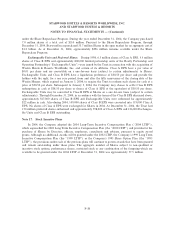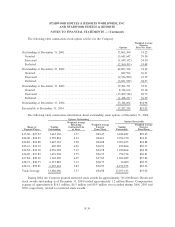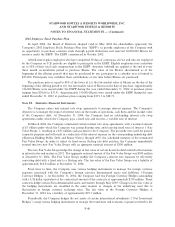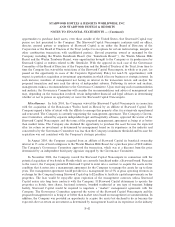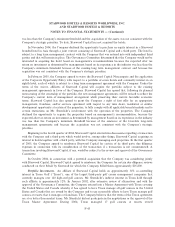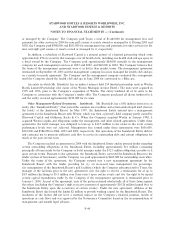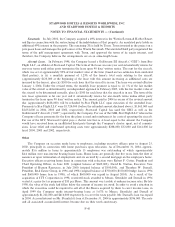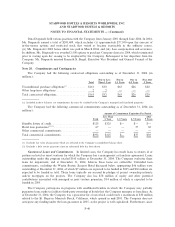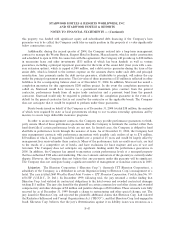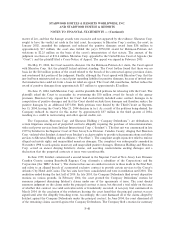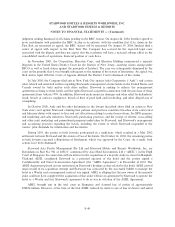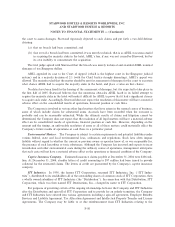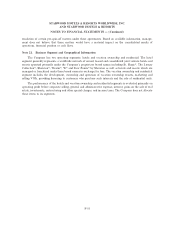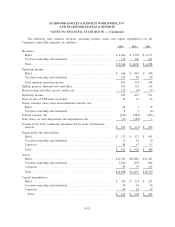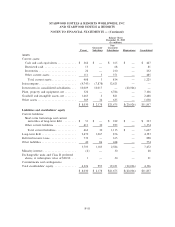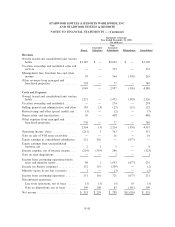Starwood 2004 Annual Report Download - page 114
Download and view the complete annual report
Please find page 114 of the 2004 Starwood annual report below. You can navigate through the pages in the report by either clicking on the pages listed below, or by using the keyword search tool below to find specific information within the annual report.STARWOOD HOTELS & RESORTS WORLDWIDE, INC.
AND STARWOOD HOTELS & RESORTS
NOTES TO FINANCIAL STATEMENTS Ì (Continued)
matter of law, and that the damage awards were excessive and not supported by the evidence. Sheraton Corp.
sought to have the verdict set aside in the trial court. In response to Sheraton Corp.'s motion, the court, in
January 2002, amended the judgment and reduced the punitive damages award from $38 million to
approximately $17 million; the court also trebled the jury's $750,000 award for Robinson-Patman Act
violations to $2.25 million on the basis of the court's interpretation of that statute. The amount of the
judgment was then set at $31.4 million. Sheraton Corp. appealed to the United States Court of Appeals (the
""Court'') and the plaintiÅ Ñled a Cross-Notice of Appeal. The appeal was signed in February 2003.
On May 25, 2004, the Court issued its decision. On the Robinson-Patman Act claim, the Court agreed
with Sheraton Corp. that the plaintiÅ lacked antitrust standing. The Court further found that there was no
basis for the $10 million portion of the award related to the breach of the contractual agency provision claim,
and overturned that portion of the judgment. Finally, although the Court agreed with Sheraton Corp. that the
jury had been misinstructed on a crucial point regarding liability for punitive damages, because of invited error
that misinstruction could not form a basis for relief on appeal. The Court did, nonetheless, further reduce the
award of punitive damages from approximately $17 million to approximately $2 million.
On June 15, 2004, both Sheraton Corp. and the plaintiÅs Ñled petitions for rehearing with the Court. The
plaintiÅs asked the Court to reconsider its overturning the $10 million award for breach of the agency
provision. Sheraton Corp. argued that the Court had inadvertently included some contract damages in its
computation of punitive damages and that the Court should exclude those damages and therefore reduce the
punitive damages by an additional $375,000. Both petitions were denied by the Third Circuit on Septem-
ber 15, 2004, leaving the Court's May 25, 2004 decision in tact. As a result of the petitions being denied, the
Company reduced its reserve for this matter by approximately $37 million in the third quarter of 2004,
resulting in a credit to restructuring and other special credits, net.
The Corporation, Sheraton Corp. and Sheraton Holding (""Company Defendants'') are defendants in
certain litigations arising out of purported contracts allegedly requiring the purchase of telecommunication,
video and power services from Intelnet International Corp. (""Intelnet''). The Ñrst suit was commenced in late
1997 by Intelnet in the Superior Court of New Jersey Law Division: Camden County, alleging that Sheraton
Corp. violated what Intelnet claimed were Intelnet's exclusive rights to provide telecommunications and other
services to Sheraton Holding and its aÇliates (""First Suit''). The complaint sought injunctive relief to enforce
alleged exclusivity rights and unquantiÑed monetary damages. The complaint was subsequently amended in
November 1998 to seek speciÑc monetary and unspeciÑed punitive damages. Sheraton Holding and Sheraton
Corp. served an answer denying Intelnet's claims, and asserting counterclaims seeking damages and a
declaration that the purported contracts at issue were unenforceable.
In June 1999, Intelnet commenced a second lawsuit in the Superior Court of New Jersey Law Division:
Camden County, naming Boardwalk Regency Corp. (formerly a subsidiary of the Corporation) and the
Corporation (the ""BRC Action''). The claims in this case are similar in nature to those made in the First Suit,
and relate to an alleged breach of a purported exclusive contract to provide certain services to the Caesar's
Atlantic City Hotel and Casino. The two suits have been consolidated and were in mediation until 2001. The
mediation ended during the Ñrst half of 2001. In late 2003, the Company Defendants Ñled several dispositive
motions on various grounds. In February 2004, the court granted the Company Defendants' motion for
summary judgment dismissing Intelnet's claims under one of the agreements at issue. The court denied
summary judgment on the claims under the principal contract at issue, but directed a trial solely on the issue
of whether that contract was valid and enforceable or fraudulently executed. A non-jury trial commenced in
March 2004. At the conclusion of the evidentiary hearing, the court found that the principal contract was not
signed until after the allegedly breaching event. Accordingly, the court dismissed all of the claims alleged by
Intelnet against the Company Defendants under the principal contract. In June 2004, the court dismissed all
of the remaining claims asserted against the Company Defendants. The Company Ñled a motion for summary
F-48


